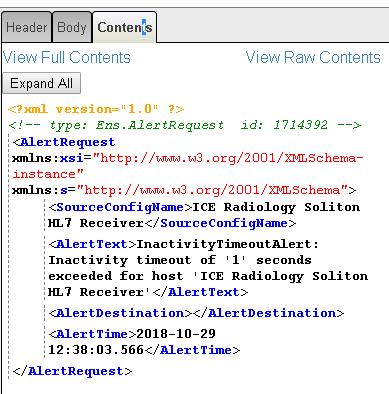how to reference Header and Body properties of a message in a Routing rule?
Hi,
Any idea how to reference Header and Body properties of a message in a Routing rule?
I know how to address HL7 and AlertText – but I don’t know how to reference Header and Body properties directly!
(I want to do this because addressing properties directly is quicker than searching the text of the message.)




KR
Stephen
Comments
Hi Stephen,
Interesting question.
The routing engine gets passed a context object that contains a Document object. This is the request object, so in your example you are directly accessing your Ens.AlertRequest with Document.AlertText.
I did a full dump of the context object so you can see what properties are available...
{
"ActionTargets":"Foo.Productions.TEST2RoutingRule",
"Adapter":"",
"AlertGroups":"",
"AlertOnBadMessage":null,
"AlertOnError":false,
"AlertRetryGracePeriod":0,
"BadMessageHandler":"",
"BusinessPartner":"",
"BusinessRuleName":"Foo.Productions.TEST2RoutingRule",
"Document":{
"AlertDestination":"The alert destination",
"AlertText":"The alert text",
"AlertTime":"2018-10-29 15:29:18.517",
"SessionId":null,
"SourceConfigName":"souce"
},
"FailureTimeout":15,
"ForceSyncSend":null,
"InactivityTimeout":0,
"MsgClass":"Ens.AlertRequest",
"QueueCountAlert":0,
"QueueWaitAlert":0,
"ReplyCodeActions":"",
"ResponseFrom":"",
"ResponseTargetConfigNames":"",
"ResponseTimeout":-1,
"Retry":false,
"RetryInterval":5,
"Source":"EnsLib.Testing.Process",
"SuspendMessage":false,
"ThrottleDelay":0,
"Validation":"",
"aRespFrom":{
}
}There doesn't look to be any access to the Header object on the context object.
So I did a dump of the stack to see if its visible outside of the context object, but it looks like the routing rules are scoped off to just the arguments it takes...
{
"Objects":{
"pContext":{
"Properties":{
"ActionTargets":"Foo.Productions.TEST2RoutingRule",
"Adapter":"",
"AlertGroups":"",
"AlertOnBadMessage":null,
"AlertOnError":false,
"AlertRetryGracePeriod":0,
"BadMessageHandler":"",
"BusinessPartner":"",
"BusinessRuleName":"Foo.Productions.TEST2RoutingRule",
"Document":{
"AlertDestination":"3",
"AlertText":"2",
"AlertTime":"2018-10-29 15:36:24.273",
"SessionId":null,
"SourceConfigName":"1"
},
"FailureTimeout":15,
"ForceSyncSend":null,
"InactivityTimeout":0,
"MsgClass":"Ens.AlertRequest",
"QueueCountAlert":0,
"QueueWaitAlert":0,
"ReplyCodeActions":"",
"ResponseFrom":"",
"ResponseTargetConfigNames":"",
"ResponseTimeout":-1,
"Retry":false,
"RetryInterval":5,
"Source":"EnsLib.Testing.Process",
"SuspendMessage":false,
"ThrottleDelay":0,
"Validation":"",
"aRespFrom":{
}
},
"Reference":"3@EnsLib.MsgRouter.RoutingEngine"
}
},
"Primatives":{
"pEffectiveBegin":"",
"pEffectiveEnd":"",
"pPassed":"1",
"pReason":"",
"pReturnValue":"",
"pRuleSet":"",
"tSC":"1"
},
"Stack":{
"1":"zStart+62^Ens.Job.1 +2 : Set tInstance.%QuitTask=0, tSC=tInstance.OnTask() Quit:('tSC)||tInstance.%QuitTask",
"2":"zOnTask+42^Ens.Host.1 +1 : Set tSC=..MessageHeaderHandler(tRequestHeader,.tResponseHeader)",
"3":"zMessageHeaderHandler+42^Ens.Actor.1 +1 : Set tSC=tBP.MessageHeaderHandler(pRequestHeader,.pResponseHeader,.tHandledError) ; Sets SessionId, we clear it",
"4":"zMessageHeaderHandler+18^Ens.BusinessProcess.1 +1 : Set tSC=..OnRequest(..%request,.tResponse)",
"5":"zOnRequest+21^EnsLib.MsgRouter.RoutingEngine.1 +1 : Quit ..doOneAction(request,\"rule:\"_tRuleName,,,.response) }",
"6":"zdoOneAction+8^EnsLib.MsgRouter.RoutingEngine.1 +1 : Set tSC=##class(Ens.Rule.RuleDefinition).EvaluateRulesEx(tOneTarg, ..%SessionId, $this, $classname(), .tActionList) Quit:('tSC)",
"7":"zEvaluateRulesEx+3^Ens.Rule.RuleDefinition.1 +1 : Quit ##class(Ens.Rule.Definition).EvaluateRules(pRuleName,pSessionId,pContext,pActivityName,.pReturnValue,.pReason)",
"8":"zEvaluateRules+12^Ens.Rule.Definition.1 +1 : set tSC=$classmethod(tClassName,\"evaluateRuleDefinition\",pContext,.tRuleSet,.tEffectiveBegin,.tEffectiveEnd,.pReturnValue,.pReason)",
}
}So I think the short answer is going to be not directly.
I can access the request ID in the code behind, using the %Id() method, but the rule validator doesn't seem to like referencing it.
I had a quick hack and managed to find one way by using a custom function, its a hack but something like this, but maybe using dynamic SQL to access the value...
Class Foo.FSET Extends Ens.Rule.FunctionSet{ClassMethod HeaderPropertyEquals(obj, name, value){set bid=obj.%Id()&sql(select id into :id from Ens.MessageHeader where MessageBodyId=:bid)set mh=##class(Ens.MessageHeader).%OpenId(id)quit $property(mh,name)=value}}You can then call this function in the rule set as a condition...
HeaderPropertyEquals(Document,"SourceConfigName","Foo Service")
Can't say I have ever wanted to access the Header object, but interesting to hack around the code behind to see whats going on.
Sean